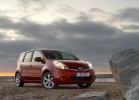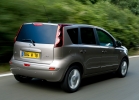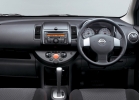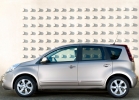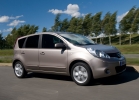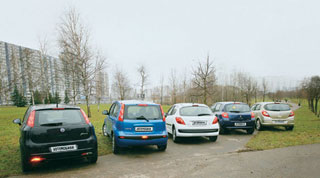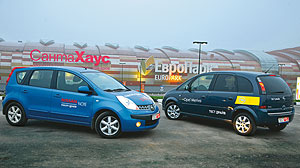Nissan Note test drive since 2005 minivan
For family circumstances
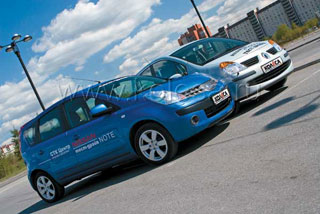 The creators of such crumbs believe that this is exactly what young families need: average mothers and dads with children, mother -in -law and other family members.
The creators of such crumbs believe that this is exactly what young families need: average mothers and dads with children, mother -in -law and other family members. Both cars appeared in Russia almost simultaneously and while in salons they are more common than on the streets. Interestingly, temporarily or not?
Looking at the statistics of sales of foreign cars in Russia, it seems that Nissan Note and Renault Modus do not have many chances. Most Russians first choose that at a lower cost, and only then - with a higher quality. And lastly, buyers are forced to pay extra for the brand, individuality, centimeters and horses. Our today's heroes do not pretend to be the best price-quality ratio, but intend to attract customers with other, less tangible advantages. We took 2 top settings for cars equipped with 1.6-liter 110-horsepower engines, 4-speed assault rifles and standing slightly more than $ 20,000.
Three months ago, when we first met Modus, it seemed much prettier: a cheerful humanoid muzzle, a huge area of \u200b\u200bglazing, unusual decisions of the front and posterior optics ... Now, against the background of a Japanese nozzle, the Frenchman is slightly faded. Next to Note, it seems gray, hunched over, with no frivolous grin from where
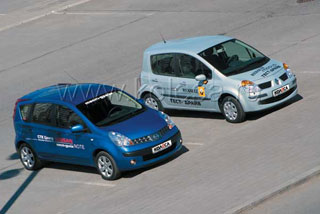 Note is distinguished by large front optics and stylish rear lights, an adult grille of the radiator - almost like a very solid Murano, 16 -inch wheels and bright blue. Nissan complies with the laws of the compact-wen genre, bringing his own, bright and sonorous note.
Note is distinguished by large front optics and stylish rear lights, an adult grille of the radiator - almost like a very solid Murano, 16 -inch wheels and bright blue. Nissan complies with the laws of the compact-wen genre, bringing his own, bright and sonorous note. Of course, appearance is a criterion based on a subjective assessment, but when choosing a car of this class, they rely on it almost in the first place. Therefore, the word is photographs, and it is worth delving into other comparative characteristics of cars: for example, in dimensions. Note is longer (+91 mm), below (-39 mm) and has a larger wheelbase (+118 mm) than Modus. So, without getting behind the wheel, it can be assumed that the Japanese will most likely be better controlled and travel faster (it is 70 kg easier with the same engine power). But we will check it a little later - first you should look around in the cabin.
We described the modus recently, and a few months after our first date with him in his interior, nothing changed. It is spacious here, the dashboard is still not in the usual place (the only bunker sticks out in the center of the torpedo and displays all the necessary indicators), and the view from the windows pleases with the breadth of the review. But, I admit, the Frenchman is boring in the salon.
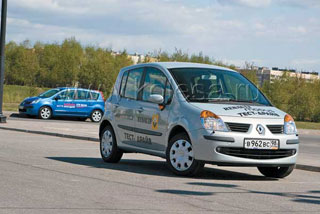 But in Note - not at all. Its salon is finished with a black cloth with leather inserts, a 3-spacecraft and seats are sheathed with red threads; The atmosphere is a pleasant mood. The instrument panel, with a white background, is well read, there are also no complaints about the steering wheel switches. You will not immediately notice the glove compartment: in its place there is a pocket A4. It seems that there are no things for opening the glove box, but in the middle of the pocket, closer to the torpedo, you can find the treasured button that opens access to the cooling and heated (and also quite spacious) box.
But in Note - not at all. Its salon is finished with a black cloth with leather inserts, a 3-spacecraft and seats are sheathed with red threads; The atmosphere is a pleasant mood. The instrument panel, with a white background, is well read, there are also no complaints about the steering wheel switches. You will not immediately notice the glove compartment: in its place there is a pocket A4. It seems that there are no things for opening the glove box, but in the middle of the pocket, closer to the torpedo, you can find the treasured button that opens access to the cooling and heated (and also quite spacious) box. The steering wheel is convenient, the gearbox lever is within reach. The seats are moderately tough, with sufficient support for the hips and lower back: the movements are not constrained, and the back does not strain. The three of the back is crowded, but two are just right. And the pillow of the front passenger chair also rises, opening access to the secretary, which will be appreciated by those who have something to hide ...
By the way, there are a lot of such hidden places. For example - a double bottom in the trunk. The chip consists in 2 flexiboard wings, manipulations with which determine the height of the floor in the luggage compartment. Plus, they also have different coverage on each side: to transport both clean and dirty items.
 Both cars that we got to the test are charged (if this word is applicable to them) to the maximum. As we noted above, motors and boxes are the same, but on the road the cars behave differently. Let's start with Modus. Starts quietly and also works. Nicely! The car touches immediately, as soon as you release the brake pedal. You open the gas - and Modus rushes briskly forward. Switching occurs smoothly and almost imperceptibly, as if the transmission here is one, not four. And it is worth finding the floor under the right pedal, as Renault will become mischievous and pleasantly surprise unexpected acceleration. But there are not many mischief and desire to accelerate in it (when compared with NOTE). Nissan is much more frequent on the bottoms, more sensitive to the right pedal and more responsive to the KIK Dawn mode. And the brakes of cars are equally good. There is no difference: both stop in a timely manner, and the effort on the pedals is easy to control.
Both cars that we got to the test are charged (if this word is applicable to them) to the maximum. As we noted above, motors and boxes are the same, but on the road the cars behave differently. Let's start with Modus. Starts quietly and also works. Nicely! The car touches immediately, as soon as you release the brake pedal. You open the gas - and Modus rushes briskly forward. Switching occurs smoothly and almost imperceptibly, as if the transmission here is one, not four. And it is worth finding the floor under the right pedal, as Renault will become mischievous and pleasantly surprise unexpected acceleration. But there are not many mischief and desire to accelerate in it (when compared with NOTE). Nissan is much more frequent on the bottoms, more sensitive to the right pedal and more responsive to the KIK Dawn mode. And the brakes of cars are equally good. There is no difference: both stop in a timely manner, and the effort on the pedals is easy to control. Nissan is almost louder than Modus - maybe a little bit. In addition, it gives the impression of a more collected, sharp and sensitive to driving a car. The Japanese did not exaggerate when they advertised Note as a driver compact lure. His reactions are not smeared, like a modus, the steering wheel is much sharper, and the rolls are smaller. But both of them and the other car are difficult to control at speeds exceeding the border of the driver’s license.
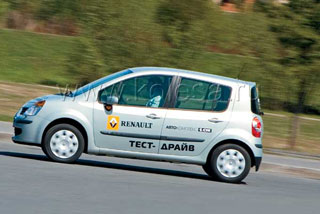 The height of cars and small weight (at a high center of gravity) make them sensitive to the side wind, literally blowing off the trajectory. True, thanks to 16-inchs in the wheel arches and the slightly best settings of the Note chassis, it still seems a little more stable. The suspension is more energy -intensive in Renault: the assault on artificial road bumps showed the complete superiority of the Frenchman.
The height of cars and small weight (at a high center of gravity) make them sensitive to the side wind, literally blowing off the trajectory. True, thanks to 16-inchs in the wheel arches and the slightly best settings of the Note chassis, it still seems a little more stable. The suspension is more energy -intensive in Renault: the assault on artificial road bumps showed the complete superiority of the Frenchman. As a result, we recognize Note as a more dynamic, driver oriented car. Modus has much calmer character; He is less demanding on the driver, and he cannot demand much from him. The interior is more pleasant, on the contrary, with Nissan, and outwardly both cars are original. At the same time, Note seems less feminine, rather even made in the unisex style. The remaining differences are in the characteristics table. So, if family circumstances require the purchase of a roomy and compact car, we advise you to take a closer look at this couple.
Nissan Note
The basic configuration of Comfort Nissan Note costs $ 14,990. The car is equipped with a 5-speed mechanical KP and a 1.4-liter 88-horsepower engine. Increase engine volume to 1.6 liters. You can for about $ 2,300, and add an automatic transmission - for another $ 1,000. Standard equipment includes a pillow for a driver, a pillow for a front passenger, ABS, an electronic brake distribution system EBD, an emergency braking amplifier Nissan Brake Assist, a central castle from DU and Anti-Hijack system, immobilizer, headlight washers, external electric mirrors and heating.
Renault Modus
Prices for Renault Modus start at $ 16,699. The car in the basic configuration Authentique is equipped with a 1.2-liter engine and a mechanical gearbox. A unit with a volume of 1.4 liters. It will cost $ 18,169, and a version with a 1.6-liter engine and an automatic checkpoint costs $ 20 879. ABS with an EBD brake forces distribution system and AFU emergency braking system, adaptive frontal pillows of the driver’s safety and passenger, front seats with adjustment. In height and lumbar adjustment, on -board computer and headlight washers.
Cars were provided for test Autocenter STK
Text: Alexander Korobchenko
Photo: Roman Ostanin
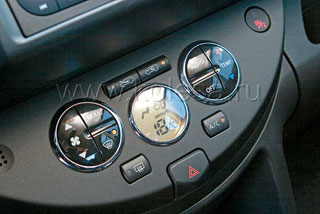
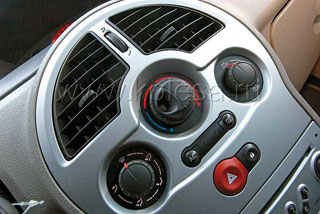
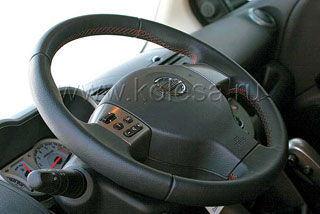
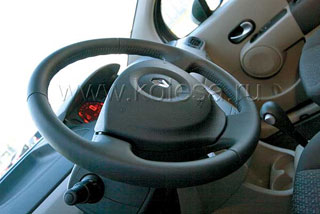
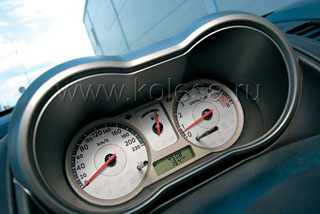
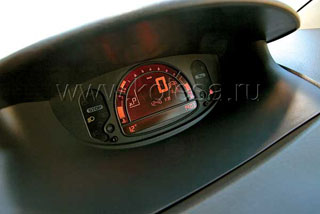
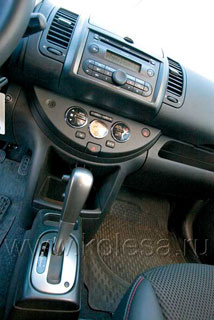
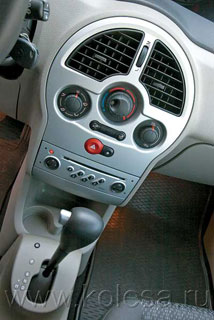
Source: Wheel magazine [No. 104/2006]
Nissan Note Crash Video since 2005
Nissan Note test drive since 2005
Nissan Note Crash Test since 2005
Krassh Test: Detailed Information31%
Driver and passengers
15%
Pedestrians
32%
Children-passengers
Nissan Note malfunctions since 2005
Nissan Note malfunctions: Detailed information| NOTE since 2005 | |
|---|---|
| Engine |  |
| Transmission |  |
| Control system and suspension |  |
| Brake system |  |
| Air heating and air conditioning |  |
| Launch and charging system |  |
| Electric components and so on |  |
| Corrosion body stability |  |

